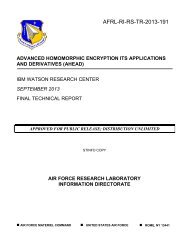EN100-web
EN100-web
EN100-web
Create successful ePaper yourself
Turn your PDF publications into a flip-book with our unique Google optimized e-Paper software.
Special theme: Scientific Data Sharing and Re-use<br />
Sailing towards Open Marine Data:<br />
the RItMARE Data Policy<br />
by Anna Basoni, Stefano Menegon and Alessandro Sarretta<br />
A thorough understanding of marine and ocean phenomena calls for synergic multidisciplinary data<br />
provision. Unfortunately, much scientific data is still kept in drawers, and in many cases scientists<br />
and stakeholders are unaware of its existence. At the same time, researchers lament the time<br />
consuming nature of data collection and delivery. To overcome barriers to data access, the RITMARE<br />
project issued a data policy document, an agreement among participants on how to share the data<br />
and products either generated by the project activities or derived from previous activities, with the<br />
aim of recognizing the effort involved.<br />
The RITMARE Flagship Project is one<br />
of the National Research Programs<br />
funded by the Italian Ministry for<br />
Education, University and Research,<br />
coordinated by the National Research<br />
Council (CNR) and involving the whole<br />
Italian marine research community. The<br />
project’s main goal is the interdisciplinary<br />
integration of national marine<br />
research.<br />
The objective of the RITMARE Data<br />
Policy (RDP) is to define common rules<br />
on how to access, use and share the<br />
information provided by the project for<br />
an improved understanding of the<br />
marine environment.<br />
The RDP was formulated taking into<br />
account:<br />
• the international scientific community,<br />
which strongly encourages the<br />
rapid sharing of information;<br />
• the European Union which, in numerous<br />
directives, has clearly stated that<br />
free access to data and products generated<br />
by public funds is the only way<br />
to go [1];<br />
• the Italian Digital Agenda, which is<br />
gradually formulating rules to govern<br />
open access [2].<br />
Briefly, in accordance with several initiatives<br />
within the marine scientific context,<br />
the RDP tries to reach a trade-off<br />
between two conflicting needs: (i) the<br />
demand for easy and open access to<br />
data, and (ii) the requirements of data<br />
generators to see their work recognized<br />
and to have sufficient time to communicate<br />
their results and hypotheses.<br />
The RDP does not apply to sensitive<br />
data, which is subject to agreements<br />
with protection and security institutions.<br />
Some other exemptions (potentially<br />
sensitive data for socio-economic<br />
reasons) can be evaluated by the RDP<br />
Governance Board. These rules represent<br />
the maximum level of data constraint<br />
accepted within the RITMARE<br />
project. Researchers, however, are<br />
encouraged to attribute less restrictive<br />
norms. In fact, even though licences<br />
that restrict the re-use of data to noncommercial<br />
purposes (e.g., the<br />
Creative Commons license CC-BY-<br />
NC) were accepted, the RDP recommends<br />
the use of less binding licences<br />
(e.g., CC-BY).<br />
Figure 1: RITMARE Data Policy rules.<br />
The highlights of the RDP are summarized<br />
in Figure 1, which illustrates the<br />
seven mandatory rules for the project.<br />
The first rule defines the involved parties:<br />
the entire RITMARE marine<br />
research community, both internal and<br />
external to the project. The second rule<br />
states that each user shall name the data<br />
generator; the third rule requires that<br />
everyone interested in publishing the<br />
data in scientific publications, abstracts<br />
and technical reports, within the first<br />
22<br />
ERCIM NEWS 100 January 2015



